初一英语Module_1A
七年级英语上学期Module 1 Unit 1PPT教学课件
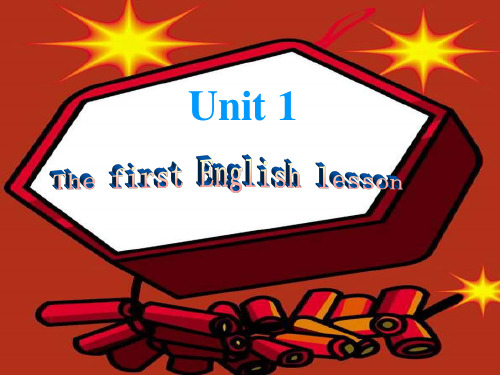
2021/01/21
7
A: What’s your name? B: My name’s…
A: Where are you from? B: I’m from…
A: Nice to meet you,… B: Nice to meet you, too.
2021/01/21
8
THANKS FOR WATCHING
5 Wang Hui is twelve years old. ( )
2021/01/21
5
1 Miss Li is a _t_e_a_ch__er__.She is __C__h_in__es_e_______. 2 LingLing is a _s_tu_d_e_n_t_.She is a _f_r_i_en_d__ of Daming. 3 Daming is from _B_e_ij_i_n_g__.He is _t_w_e_l_v_e__years old. 4 WangHui is a _s_t_u_d_e_n_t__.He is from __S_h_a_n_g_h_a_i.
( A )4 _______ are you from? A Where B what C how
2021/01/21
2
请用am, is, are填空 (1) — _A__re__ you Mr Black? — Yes, I __a_m___. (2) This ___is_____ Jim Green. (3) My name _is__ Li Fen. What _i_s your name? (4) — How __a_re__ you, Mr King?
— I __a__m____ fine, thank you. (5) — What ___i_s____ this in English?
七年级英语module1知识点归纳

七年级英语module1知识点归纳七年级英语Module 1知识点归纳Module 1作为初中英语学习的开端,是英语学习中非常基础的部分,为学生了解基础的词汇、语法提供了基础,并且也重视对学生的语言运用能力培养。
本文将为读者梳理Module 1的知识点,以便更好地掌握英语学习的基础。
1. 问候语问候语是英语学习的重要基础之一。
在开始学习英语时,学生需要掌握常见的问候语,例如:- Good morning / afternoon / evening.(早上/下午/晚上好。
)- How are you?(你好吗?)- I'm fine, thank you. / Fine, thank you.(我很好,谢谢。
)- And you?(你呢?)2. 介绍自己介绍自己是基础英语学习的重要组成部分,下面是一些基本的自我介绍方式:- My name is ____.(我的名字是____。
)- I'm ____ years old.(我今年____岁。
)- I'm from ____.(我来自____。
)- Nice to meet you.(很高兴认识你。
)3. 词汇英语词汇也是英语学习的重要组成部分之一。
以下是Module 1中常见的基础词汇:- numbers(数字)- colors(颜色)- family members(家庭成员)- animals(动物)4. 语法基础的英语语法对学生的英语学习非常重要。
以下是Module 1中的基础语法知识点:- 动词“to be”:- I am, you are, he / she / it is, we are, they are.- 名词单数和复数:- 单数名词加“s”。
- 以“s”、“x”、“ch”、“sh”结尾的名词加“es”。
- 以辅音字母+y结尾的名词,把“y”变成“i”,再加“es”。
- 形容词比较级和最高级:- 比较级:形容词 + er。
七年级英语上册-Module-1-My-classmates-Unit-1-Nice-to-meet

30/57
4. —Is Betty English? — Yes, she is. / No, she isn’t.
5.— Are you from China? — Yes, I am. / No, I’m not.
16/57
【辨析】Ms, Miss, Mrs与Mr
17/57
【注意】在英语中,称呼老师 不能用“Teacher+姓氏”,而 应该依据姓氏称呼男老师为
18/57
“Mr+姓氏”,称呼女老师为 “Ms+姓氏”。假如已知某女 老师未婚,则也可用“Miss + 姓氏”。
19/57
4. American n. 美国人; 美洲人
Ms Li: How old are you? Lingling: I’m thirteen years old.
25/57
Ms Li: Good. Hello, what about you? Daming: Hello, Ms Li. My name is Li
Daming and I’m from Beijing too. I’m twelve years old. Ms Li: Thanks. Hello, are you from America?
he/she/it is=he’s/she’s/it’s
what is = what’s name is = name’s
is not = isn’t
are not = aren’t
that is =that’s
【注意】
this is和am not没有缩写形式。
七年级英语上学期Module-1-Unit-1外研英语
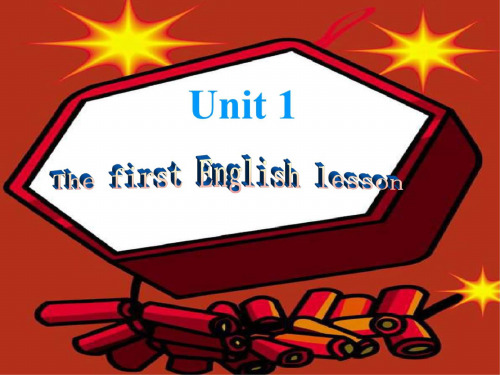
一个没有地位的家庭妇女能做主的事实在有限,买菜做饭打扫卫生,就这些吧。一日三餐,外婆在厨房劳作。煤气有,但基本上只在冬天洗澡时才用。平时烧的是木柴。木柴怎么来的?好像林业局 每家的柴火间都堆得满满的,这是外公的事。至于要怎么样用火柴把火点燃,外公不管,反正每顿都能吃上热饭就行。他完全看不见,那一堆堆木柴是怎么被一堆堆码在太阳下晒干,又是怎样一堆堆码 回去的。是的,总有些这样的人,他们看不到过程,却总追究话。同一个屋檐下有分明的楚河汉界。闲下来时,外婆会坐在厨房的矮凳上发呆,或者在晾晒的阳台看看天,这是外公绝对不会踏足的地方。到了饭点,外婆早早把外公的碗筷摆好, 酒瓶摆好,等他喝完了再去给他盛饭。至于她自己,常常夹了菜去阳台,或者等外公吃完再去厨房吃。
长年分居似乎是再正常不过的事情。外婆十八岁嫁给外公,从上个世纪五十年代中期一直持续到七十年代中期,具体地说是从一九五五到一九七五(我的小姨是一九七五年出生的)整整二十年,她 经历了六次生产,不下于五次的小产和流产。婚姻让良田变成薄地,留给女人一个受伤的子宫,让她老来还不得不去医院看妇科,这委实有些羞耻。他们之间早已经不需要用同床共枕来粉饰太平。长了 眼睛的都看得出来这是一对怨偶。外婆知道那个男人恨她,她怕那个男人,她心有亏欠。她是欠下巨债的杨白劳,却没有足以抵债的喜儿。恰恰相反,她生下的一连串喜儿,是一连串的债务证明。
初中英语七年级上册Module 1 Unit 1课件
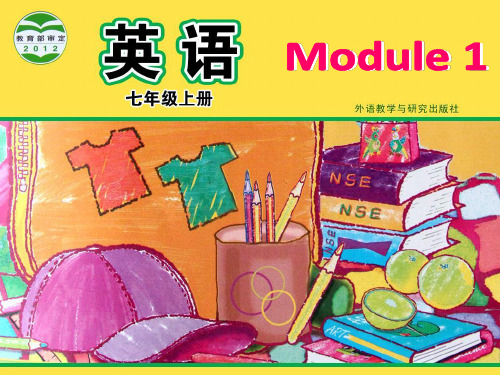
( A)1. Li Fang is from _____.
A. Wuhan B. Shanghai C. Beijing
( B )2. Daming is _____ years old.
A.11
B.12 C.13
( A )3. Are Tony and Betty in Class 4 Grade 7 ?
A. Yes, they are.
B. No, they aren’t.
C. We don’t know.
听填信息
Name Lingling
City Beijing
Age
(1)_1_3____
years old
Daming
(3)_1_2____ (2)_B_e__ij_in_g__ years old
Everyday English
Hello! Hi! Nice to meet you! Thanks.
Pronunciation
Chinese meet teacher Betty Tony English is friend twelve thanks
1. I’m from Wuhan. 我来自武汉。 be from 表示“来自哪里”、“从哪里 来”或“是哪里人”。如: He’s from Beijing. 他来自北京。
七年级英语MODULE1知识点

七年级英语MODULE1知识点Module 1是初中英语的开始,也是初中英语的基础,其中包含的知识点涉及到英语的基本语法、词汇量以及学习策略等多个方面。
接下来,本文将为大家详细介绍七年级英语MODULE1的知识点。
一、基本语法1. 时态:Module 1主要涉及以下五种时态的学习:(1)一般现在时:表示习惯、事实和真理,形式为“主语+动词原形”。
(2)现在进行时:表示现在正在进行的动作,形式为“主语+be动词+现在分词”。
(3)一般过去时:表示已经发生的过去事件,形式为“主语+动词的过去式”。
(4)过去进行时:表示过去某一时刻正在进行的动作,形式为“主语+was/were+现在分词”。
(5)一般将来时:表示将要发生的动作,形式为“主语+will+动词原形”。
2. 疑问句:Module 1中,疑问句主要分为两种:一种是一般疑问句,另一种是特殊疑问句。
一般疑问句可用“主语+助动词+主语+动词原形”形式来表示;特殊疑问句通常以疑问词开头,疑问词包括who、what、when、where、why、which等。
3. 肯定句和否定句:Module 1中的肯定句和否定句的形式较简单,以“主语+动词+……”为主,主语和动词的形式多种多样。
二、词汇量Module 1的词汇量以日常用语为主,主要包括以下几个方面的内容:1. 数字:表示数字的单词和数字的序数词。
2. 家庭:表示家庭成员的单词,如father、mother、brother和sister等。
3. 食物:表示食物的单词,如vegetable、fruit、meat和fish等。
4. 娱乐活动:如play sports、watch TV、listen to music等。
三、学习策略1. 听力:在学习英语中,听力是至关重要的一环。
Module 1中,英语老师通常会播放一些简短的对话或短文,帮助学生提高听力水平。
在听力练习中,学生需要注意细节,例如对话中的人物、时间、地点和发生的事件等。
新外研英语七年级上 Starter 部分 《Module1 Unit1 》教学设计

新外研英语七年级上 Starter 部分《Module1 Unit1 》教学设计一. 教材分析《新外研英语》七年级上册Starter部分《Module1 Unit1》主要介绍了日常生活中的基本问候语和介绍自己的方式。
本单元包括三个主要句子:“Hello, my name is…”“Good morning/afternoon/evening, my name is…”“Nice to meet you.”以及一个常用表达:“How are you?”本单元的教学目标是让学生掌握基本的日常英语问候和自我介绍,并能够运用到实际生活中。
二. 学情分析七年级的学生刚开始接触英语,对于大部分学生来说,英语是一门全新的学科。
因此,学生在学习过程中需要逐步建立对英语的兴趣和信心。
在《Module1 Unit1》的教学中,学生需要掌握基本的日常英语问候和自我介绍,为以后的学习打下基础。
三. 教学目标1.知识目标:学生能够掌握基本的日常英语问候和自我介绍,如“Hello,my name is…”“Good morning/afternoon/evening, my name is…”“Nice to meet you.”以及“How are you?”2.能力目标:学生能够听、说、读、写这些问候和自我介绍的表达,并在实际生活中运用。
3.情感目标:通过学习英语问候和自我介绍,学生能够更加自信地面对新的学习环境,建立良好的同学关系。
四. 教学重难点1.重点:学生能够掌握基本的日常英语问候和自我介绍。
2.难点:学生能够正确地发音和运用这些问候和自我介绍的表达。
五. 教学方法1.任务型教学法:通过设定各种实际情境,让学生在完成任务的过程中运用所学知识。
2.情境教学法:创造真实的语言环境,让学生在实际情境中学习英语。
3.交互式教学法:引导学生相互交流、互动,提高学生的参与度和积极性。
六. 教学准备1.教师准备:熟悉教材内容,了解学生的学习情况,设计教学活动和作业。
外研版七年级英语上册Module-1-课件

外研版七年级英语上册M o d u l e-1-课件-CAL-FENGHAI.-(YICAI)-Company One1Module 1 My teachher and my friends Unit 1 Good morning ,Miss ZhouUnit 2 Good morning , I’m Chen Zhong. Unit 3 This is my friend .Module 2 My English lesson .Unit 1 Open your bookUnit 2 What’s your numberUnit 3 I’m twelve .Module 3 My English book .Unit 1 What’s this in EnglishUnit 2 Can you help me ,please Unit 3 What colour is itModule 4 My everyday life .Unit 1 What day is it todayUnit 2 What’s the weather likeUnit 3 What’s your favourite sportModule 1 My classmatesUnit 1 Nice to meet you 。
Unit 2 I’m Wang Lingling and I’m thirteen years old . Unit 3 Language in use .Module 2 My family .Unit 1 Is this your mumUnit 2 These are my parents .Unit 3 Language in use .Module 3 My school .Unit 1 There are thirty students in my class .Unit 2 The library is on the left of the playground. Unit 3 Language in use .Module 4 Healthy food .Unit 1 We’ve got lots of apples .Unit 2 Is your food and drink healthyUnit 3 Language in use .Module 5 My school day .Unit 1 I love history .Unit 2 We start work at nine o’clock .Unit 3 Language in use .Module 6 A trip to the zoo .Unit 1 Does it eat meatUnit 2 The tiger lives in Asia .Unit 3 Language in use .2012年7月第一次印刷外研社版新标准初中英语课本初中一年级上册Module 1 My teacher and my friendsUnit 1 Good morning, Miss ZhouUnit 2 Good morning. I'm Chen Zhong.Unit 3 This is my friend.Module 1 Words and expressionsModule 2 My English lessonUnit 1 Open your bookUnit 2 What's your number?Unit 3 I'm twelveModule 2 Words and expressionsModule 3 My English bookUnit 1 What's this in English?Unit 2 Can you help me, please?Unit 3 What colour is it?Module 3 Words and expressionsModule 4 My everyday lifeUnit 1 What day is it today?Unit 2 What's the weather like?Unit 3 What's your favourite sport?Module 4 Words and expressions正式课文部分(各模块有二个单元、一个单词mp3文件)Module 1 My classmatesUnit 1 Nice to meet you.Unit 2 I'm Wang Lingling and I'm thirteen years oldModule 1 Words and expressionsModule 2 My familyUnit 1 Is this your mum?Unit 2 These are my parentsModule 2 Words and expressionsModule 3 My schoolUnit 1 There are thirty students in my class.unit 2 The library is on the left of the playground.Module 3 Words and expressionsModule 4 Healthy foodUnit 1 We've got lots of applesUnit 2 Is your food and drink healthy?……Module 5 My school dayUnit 1 I love historyUnit 2 We start work at nine o'clock.……Module 8 Choosing presentsUnit 1 I always like birthday parties.Unit 2 She often goes to concerts……Module 10 Spring FestivalUnit 1 Are you getting ready for Spring Festival?Unit 2 My mother's cleaning our house and sweeping away bad luck.复习模块Revision module ARevision module A Words and expressionsRevision module BRevision module B Words and expressions。
七年级英语上册module1知识点

七年级英语上册module1知识点Module 1: Know Your CourseAs a seventh grader in an English-speaking country, it is important that you have a solid understanding of the language and its rules. Module 1 of your English class is designed to help you learn the basics of the language and improve your communication skills. In this article, we will discuss the key concepts and knowledge points covered in this module.1. The Verb "To Be"The verb "to be" is one of the most fundamental components of the English language. In this module, you will learn how to use "to be" to describe states and qualities of people and things. The verb has various forms depending on the subject (I am, you are, he/she/it is) and tense (present, past, future).2. Simple Present TenseIn addition to "to be," you will also learn about the simple present tense. This tense is used to describe habits, routines, and facts. For example, "I eat breakfast every day" or "The sun rises in the east."3. Nouns and PronounsNouns are the names of people, places, and things, while pronouns are used to refer to them. You will learn how to use different types of pronouns like subject pronouns (I, you, he/she/it, we, they) and object pronouns (me, you, him/her/it, us, them). This knowledge is crucial for understanding and constructing sentences correctly.4. Adjectives and AdverbsAdjectives are words used to describe nouns, while adverbs are used to describe verbs, adjectives, and other adverbs. For example, "happy" is an adjective that describes a person or thing, while "happily" is an adverb that describes how an action is done.5. Present Continuous TenseThe present continuous tense is used to describe actions that are happening at the present moment or are in progress. For example, "I am studying English right now" or "She is working on her homework."6. Verbs and Verb TensesVerbs are the actions or states of being that we use to make sentences. In addition to the simple present and present continuous tenses, you will also learn about the past tense, which is used to describe actions that have already happened. For example, "I ate breakfast this morning" or "She watched a movie last night."7. Question FormsAsking questions is an essential part of communication. You will learn how to form questions using the verb "to be" and other verbs. For example, "Are you a student?" or "What did you do over the weekend?"8. Word OrderThe order of words in a sentence can change the meaning. You will learn about the proper order of words in different types of sentences, such as declarative sentences (statements), interrogative sentences (questions), and imperative sentences (commands).In conclusion, Module 1 covers many essential concepts and knowledge points in English. If you can master these concepts, you will have a strong foundation that will help you communicate effectively in the language. Keep practicing and using these skills, and you will see improvement in your English proficiency.。
初一 Module1 Unit 1 doc
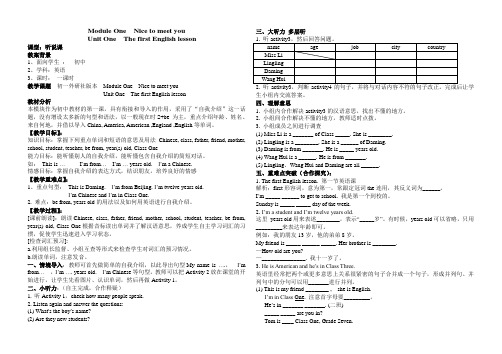
Module One Nice to meet youUnit One The first English lesson课型:听说课教案背景1、面向学生:初中2、学科:英语3、课时:一课时教学课题初一外研社版本Module One Nice to meet youUnit One The first English lesson教材分析本模块作为初中教材的第一课,具有衔接和导入的作用,采用了“自我介绍”这一话题,没有增设太多新的句型和语法,以一般现在时S+be 为主,重点介绍年龄、姓名、来自何地,并借以导入China, America, American ,England ,English等单词。
【教学目标】:知识目标:掌握下列重点单词和短语的意思及用法Chinese, class, father, friend, mother, school, student, teacher, be from, year(s) old, Class One能力目标:能听懂别人的自我介绍,能听懂包含自我介绍的简短对话。
如:This is …I’m from…I’m … years old. I’m a Chinese.情感目标:掌握自我介绍的表达方式,结识朋友,培养良好的情感【教学重难点】:1、重点句型:This is Daming. I’m from Beijing. I’m twelve years old.I’m Chinese and I’m in Class One.2. 难点:be from, years old的用法以及如何用英语进行自我介绍。
【教学过程】:[课前朗读]:朗读Chinese, class, father, friend, mother, school, student, teacher, be from, year(s) old, Class One根据音标读出单词并了解汉语意思,养成学生自主学习词汇的习惯,促使学生迅速进入学习状态。
外研版英语七年级上册module1unit

小组合作教学法能够培养学生的合作能力和团队 精神,提高他们的语言运用能力和交际能力。
特点
小组合作教学法注重学生的合作能力和团队精神 ,让学生在小组合作中学习和运用语言。
实施
在小组合作教学法中,教师需要将学生分成若干 小组,设计具有实际意义的合作任务,引导学生 进行小组讨论、合作完成作业等活动,让学生在 小组合作中学习和运用语言。
Insufficient teaching and improvement
教学内容深度不足
反思是否对某些知识点进行了深 入挖掘,是否满足了学生对于深
度学习的需求。
教学方法单一
考虑是否可以引入更多元化的教 学方法,如小组讨论、角色扮演 等,以提高学生的学习参与度和
效果。
教学节奏把控
回顾教学中是否有效地控制了节 奏,避免过快或过慢,确保学生
培养自主学习能力
教师需要培养学生的自主学习能力,鼓励他们通过阅读、听力等途径扩展词汇量,并掌握有效的词汇 学习方法。
Vocabulary learning
01
定期复习与巩固
02
教师需要定期组织复习和巩固活 动,帮助学生加深对词汇的记忆 和理解,同时及时纠正学生在词 汇运用上的错误。
Grammar learning
Situational teaching method
第一季度
第二季度
第三季度
第四季度
定义
情境教学法是一种通过 模拟真实情境来教授语 言的方法。
特点
情境教学法注重创造真 实的语言环境,让学生 在实际情境中学习和运
用语言。
优势
情境教学法能够激发学 生的学习兴趣,提高他 们的语言运用能力和交
际能力。
2019秋季外研版七年级英语上册课件Module 1 Unit 1(共15张PPT)
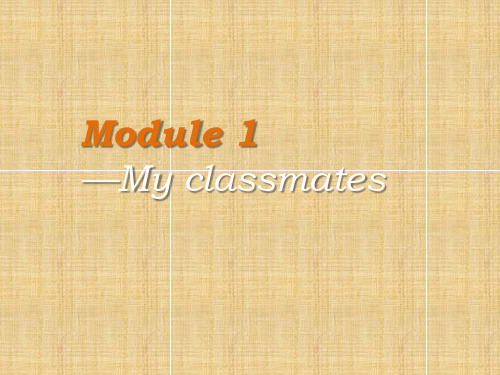
即学即练
(4) 你是广东人吗?/ 是的。 — __A_r_e__ ___y_o_u__ __fr_o_m___Guangdong? —Yes, ___I___ __a_m___. (5) 我在七年级五班,我坐在第三排。 I am in _C__la_s_s_ ___5___ _G_r_a_d_e_ ___7___ and I am in __R_o_w__ ___3___.
Englishwoman/ Englishwomen 英格兰女人
America 美 国;美洲
American adj. 美国 的;美国人的;美 洲的
American n. 美国人;美洲人 (an American; Americans)
课文导学
2. — Where are you from?你来自哪里? — I’m from Beijing. 我来自北京。
be from 意为“来自……”,与come from同义,用于 表示某人的籍贯或国籍。
要点联想
(1) 疑问句句式一:Are you from …? 你来自……吗? 回答:Yes, I am. / No, I’m not. 是的,我是。/ 不,我不 是。 疑问句句式二:Do you come from …? 你来自……吗? 回答:Yes, I do. / No, I don’t. 是的,我是。/ 不,我不是。
即学即练
2.完成下列句子。 (1) 他是英格兰人。 He ____is____ _E_n_g_l_is_h__. (2) 玛丽是美国人。 Mary ___i_s___ __A_m__e_r_ic_a_n__ . (3) 我来自湖南。 ① I _a_m____ __fr_o_m___Hunan. ② I __c_o_m_e_ __fr_o_m___Hunan.
外研版英语七年级上册Module 1知识点归纳
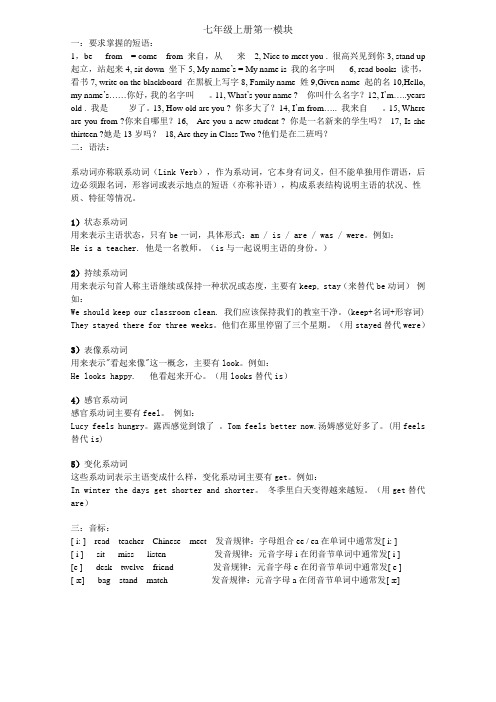
七年级上册第一模块一:要求掌握的短语:1,be from = come from 来自,从-----来2, Nice to meet you . 很高兴见到你3, stand up 起立,站起来4, sit down 坐下5, My name’s = My name is 我的名字叫-----6, read books 读书,看书7, write on the blackboard 在黑板上写字8, Family name 姓9,Given name 起的名10,Hello, my name’s……你好,我的名字叫-----。
11, What’s your name ? 你叫什么名字?12, I’m…..years old . 我是-------岁了。
13, How old are you ? 你多大了?14, I’m from….. 我来自-----。
15, Where are you from ?你来自哪里?16, Are you a new student ? 你是一名新来的学生吗?17, Is she thirteen ?她是13岁吗?18, Are they in Class Two ?他们是在二班吗?二:语法:系动词亦称联系动词(Link Verb),作为系动词,它本身有词义,但不能单独用作谓语,后边必须跟名词,形容词或表示地点的短语(亦称补语),构成系表结构说明主语的状况、性质、特征等情况。
1)状态系动词用来表示主语状态,只有be一词,具体形式:am / is / are / was / were。
例如:He is a teacher. 他是一名教师。
(is与一起说明主语的身份。
)2)持续系动词用来表示句首人称主语继续或保持一种状况或态度,主要有keep, stay(来替代be动词)例如:We should keep our classroom clean. 我们应该保持我们的教室干净。
外研版七级英语上册教学PPT Module Unit 1
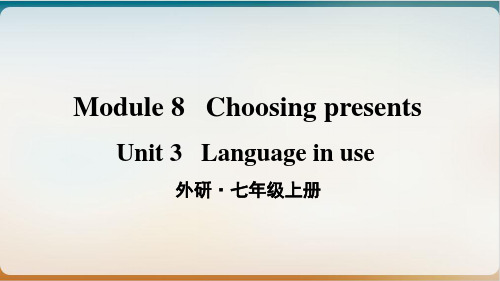
表示频度方面的区别
1. always是频度最大的词,“总是;永远;一直”。 例:我将永远记住我上学的第一天。 I always remember my first day at school. usually “通常”,即很少例外,频度仅次于 always。 例:你通常早餐吃什么? What do you usually have for breakfast?
例:我有时去图书馆。 I sometimes go to the library.
我有时在晚上看书。 Sometimes I read a book in the evening.
频度副词在句中位置
频度副词在句中习惯上位于be动词之后、行为动词之前, 助动词之后。
例:她上学经常迟到。 She is often late for school. 他通常(午夜)十二点钟睡觉。He usually goes to bed at about 12. 早上你通常什么时候起床? When do you usually get up in the morning?
Practice
1. I ________ go to the theatre, because I don’t like operas at all. A. always B. often C. sometimes D. never
2. I ________ watch this TV programme. It’s very interesting. A.often B. never C.seldom D. hardly
•2. often “经常”,在频度上不如usually那么频繁。 例:李平经常在下午做作业。 Li Ping often does his homework in the afternoon.
- 1、下载文档前请自行甄别文档内容的完整性,平台不提供额外的编辑、内容补充、找答案等附加服务。
- 2、"仅部分预览"的文档,不可在线预览部分如存在完整性等问题,可反馈申请退款(可完整预览的文档不适用该条件!)。
- 3、如文档侵犯您的权益,请联系客服反馈,我们会尽快为您处理(人工客服工作时间:9:00-18:30)。
初一英语Module 1A1.We are ___________ (有) a good time.2.Can you __________ (听见) me?3.________ (哪里) are you?4.I’m _________ (站) on the Great Wall of China and __________ (说话) to you.5.We’re on a school _______ (旅行).6.What are the __________ (其他人) doing?7.Tony is _________ (吃) an ice cream, Wanghui is _________ (拍) lots of ________(照片) and __________ (明信片).8.Daming is having __________(午饭) and ________ (躺) in the sun.9.Lingling and I are _________ (写) postcards.10.We’re _________(享受) the school trip a lot.11. __________(无论如何),we’re _________(回) home now.12. Lingling is ___________ (购物) for ___________ (礼物).13.At this ___________(片刻),in ___________ (不同的) places of the ___________(世界), people are _______________(做) different things.14.In London, it’s five o’clock, and people are _________(离开) work.15.They are _____________ (等待) for buses and _________________(跑,赶) for________________ (火车)。
16.Some are _____________(开)afternoon tea at home or walking to __________ (酒巴) and ___________ (喝) a drink.17.In Moscow it’s eight o’clock and people ____________(没有) having afternoontea. They are having ___________(晚餐)at home or in _______________(餐馆).18.Some are going to the __________(歌剧院) or _________(观看)a _____(芭蕾舞).19.Some are ____________(玩) games at home.20.In Beijing it’s one o’clock. People ________(没有) having dinner. They are____________ (睡觉).21.In Los Angeles it’s nine o’clock. People aren’t ____________ _______(起床),washing or __________ ____________(穿衣服)22.They are ____________(工作).23.Children are ___________(开始)their lessons.24.In New York it’s _______________(中午). People are ____________(看)friends,__________(打电话)home or shopping.25.______________( 问候) from Hollywood!26.I’m ___________ (拜访) my friends in Hollywood now and we’re _________(看)at the homes of the film stars.27.See you ___________(不久).28._________(谁) is she sending the postcard to?29.What _________(在) she doing?30.Are they ____________(买) postcards?31.I’m ____________(学习) English.二.用现在进行时完成句子。
例:The boys are riding (ride) bicycles.1.The girls ______ __________(buy) hot dogs.2.Daming ________ _______(eat) an ice cream.3.Tony ______ _______ (talk) on his cell phone.4.Tony _______ ________(walk) behind Daming.5.Betty _______ ________(look) at postcards.6.Betty _______ ________(carry) a bag.7.Lingling _________ _________ (take) a photo of Daming and Tony.8.The woman _______ _________ (sit) there.9.She _________ ___________ (write) a letter.10.At the moment, in different places of the world, people ______ ________(do)different things.11.Look! Our daughter __________ ______________ (washing) clothes for us.12.–Where is your mum? –Oh, she _________ ____________(cook) for us in thekitchen.13.–Where are the kids __________(do)? –They_________ ___________ (get) dressed.14. At this moment, I _____ __________(visit) China.15.–Where ________(be) they? – They ________ ____________(have) a party.16.--_________ you __________(play) computer games?—No, I’m not. I_______ ______________ (revise) for the science test. 三.翻译下列句子。
1.我正在写一封信。
2.你正在写明信片。
3.我妹妹正在打扫房间。
4.他正在吃冰激凌。
5.我们正在为春节做准备。
6.你们正在听音乐。
7.他们正在等公共汽车。
8.你在玩电脑游戏吗?9.她在做作业吗?10.你们正在学英语吗?11.他们正在谈天吗?12.你正在干什么?13.他正在干什么?14.你们正在干什么?15.他们正在干什么?16.谁在做饭?Module 21.We’re ___________ _______________(做准备) for Spring Festival.2.What’s _______________(发生)?3.What ___________(正在)the boys doing?4.I’m __________(做)lanterns.5.What’s your ______________(母亲) doing? She’s __________(打扫)the house.6.What is your aunt doing? Is she ________________(帮忙)?7.She is ________________(打扫,清洗)the floor.8.My grandmother is _______________(做饭) the meal.9.My father is __________ _____________ (正在工作).10.We have lots of _______________(传统)。
11.________(首先), we clean our houses and __________ ___________(扫去) bad luck,and ___________(然后) we _____________(漆)doors and windows red. It____________(意思是,意味着) good luck.12.We usually ______________(装饰) the doors and windows __________(用) paper cuts.13.We __________(也) buy clothes and ____________(人人) has a haircut.14.Our __________(父母亲)__________(给)us New Year _____________(礼物).15.On New Year’s Day, we _________ ________ our new clothes and ___________(拜访)our family and friends.16.There is dragon and lion _______________(舞).17.We watch TV and at ____________(午夜) there are usually ____________(烟火).18.We don’t clean our house for a few ___________(天).19.The New Year Festival _____________(结束)at Lantern Festival ________(之后)twoweeks.20.We usually eat a _________(种)of rice dumpling ____________(叫做)yuanxiao.21.They are round ________(所以) they ____________(带来) us good luck ____________________ ___________ ________________.(一年到头).22._____________(圣诞节) is the most _______________(重要的) festival in thewestern countries.23.It is to ______________ (庆祝) the birth of Jesus Christ.24.Father Christmas is a fat man _________(有)a long white beard and wears a redsuit.25.He ________(给) presents to the children.So, children love ______(他) very much.26. They are __________ (装饰) their new house now.27. He comes from a ____________(外国的) language school.二.选出斜体部分正确的词组,并在下面划线。
